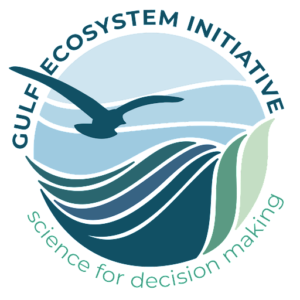Gulf Ecosystem Initiative

Overview of Gulf Ecosystem Initiative
The Gulf Ecosystem Initiative is a $3.5 million partnership between the National Center for Ecological Analysis and Synthesis (NCEAS) and the NOAA RESTORE Science Program to fund synthesis science and postdoctoral research for the Gulf. This is the third year of a five-year partnership between NOAA and NCEAS. By 2027, the initiative will support 10 scientific working groups and up to eight postdoctoral fellows.
The objectives of the Gulf Ecosystem Initiative are to use synthesis to improve the integrated understanding and management of the Gulf ecosystem and to build capacity for conducting synthesis on the Gulf ecosystem, including workforce development and promoting use of open source data.
Priority
The Gulf Ecosystem Initiative’s 2025 Call for Proposals asks project teams to propose research that is transdisciplinary and cross-sectoral and, through collaboration and innovation, seeks to tackle pressing scientific and societal challenges focused around three themes in the Gulf: fisheries, climate change, and the ecological impact of management actions.
The 2025 Call for Proposals and the application for post-doctoral positions is now closed.
Climate Change: The rate of climate change is accelerating due to human activities, which has altered the frequency and intensity of storm events, rates of sea level rise, freshwater inflows, and fish production in the Gulf. Scientists and natural resource managers currently have a limited understanding of how these climate change impacts will alter the composition and function of the Gulf ecosystem. For example, as temperature and precipitation patterns change in the northern Gulf, tropical species have begun to appear in previously sub-tropical habitats. It is unclear if tropical species will become a permanent feature of the northern Gulf and how that may impact resident species. Synthesis of temperature and salinity data, species ranges, species migration in other restricted water basins, and habitat change could provide a more complete understanding of how the recent influx of tropical species may impact previously subtropical habitats in the Gulf.
Fisheries: Fisheries are traditionally managed independently using individual stock assessments. However, increased recognition of the interactions among species and the effects of environmental change on habitat quality is leading to a shift in fisheries management from a single species approach towards an ecosystem approach. This practice is termed ecosystem-based fisheries management. For example, increased frequency of harmful algal blooms may impact fish mortality and recruitment, but current fisheries stock assessments are not sufficiently reactive to the timing and spatial extent of algal blooms. Scientific synthesis of datasets on fish recruitment, fish mortality, fishing activity, physical ocean conditions, changes in food web structures and human activity such as shipping and energy production, may produce a more robust understanding of fisheries productivity and advance ecosystem-based fisheries management in the Gulf region.
Ecological Impact of Management Actions: Management actions, including ecosystem restoration actions, govern the way that people and the environment interact. The Gulf and its watersheds are managed by federal, tribal, state, and local governments, non-governmental organizations, and private landowners. Although each management entity is tasked with managing specific environmental resources or spatial areas, individual management actions can have system-wide consequences due to ecosystem connectivity. For example, a significant fraction of freshwater that enters the Gulf is controlled by human-engineered systems. These systems control the timing, volume, and duration of freshwater input into the Gulf, which impacts both the ecosystem and human socioeconomic systems. Synthesis of previous water management actions and their impact on freshwater inflows may elucidate relationships between the timing and duration of freshwater inflows and the functioning of the ecosystem.
Amount of Funding
Each annual call for proposals will yield 2-3 working groups funded at approximately $75,000 – $125,000 to convene their teams. Funded projects will bring together working groups of 12-15 experts for 2-3 in-person collaborative sessions over the course of 24 months.
Informational Webinar
View a recording of the informational webinar on the 2025 Request for Proposals held on December 4, 2024
Key Dates
- The Gulf Ecosystem Initiative’s Call for Proposals opened November 12, 2024. Read the Call for Proposals for instructions on how to apply. Proposals were due March 14, 2025.
About NCEAS
NCEAS is one of three existing synthesis centers in the U.S. and is based in Santa Barbara, California. For over 25 years, NCEAS has supported hundreds of scientific synthesis working groups to transform existing data into knowledge that informs environmental policy and management.
The National Science Foundation supported NCEAS from 1995 – 2012. Since that time, NCEAS has invested substantial resources in developing partnerships with federal and state governments, non-profit foundations, institutions, and individuals to continually support synthesis working groups.
NCEAS has over 300 active and completed working group research projects. Previously funded activities focused on Gulf issues include a synthesis of ecotoxicology of the Gulf oil spill, aligning coastal restoration with ecological and societal needs, and a training for Gulf based researchers and managers on Open Science for Synthesis.
 Official websites use.gov
A .gov website belongs to an official government organization in the United States.
Official websites use.gov
A .gov website belongs to an official government organization in the United States.
 Secure .gov websites use HTTPS
A lock or https:// means you’ve safely connected to the .gov website. Share sensitive information only on official, secure websites.
Secure .gov websites use HTTPS
A lock or https:// means you’ve safely connected to the .gov website. Share sensitive information only on official, secure websites.